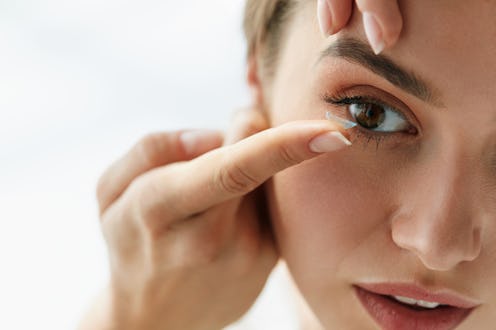
Contact lenses are a medical invention that can make life so much more convenient for anyone with vision problems. While there's obviously nothing wrong with wearing glasses (they can look so adorable and stylish!), they can also be incredibly annoying. They're tough to wear when it's really sunny out, they can sometimes feel slightly painful on your ears or nose, and it's difficult to snuggle in bed watching TV when they jam into your face. That's where contacts come in. They're much more versatile and can sometimes make you forget you even have vision issues at all, which is nice. But as great as they might be, contacts definitely aren't perfect, and there are risks to wearing contact lenses that you might not know about.
Once you get over the initial weirdness of constantly touching your own eyeball to stick a little piece of something in there so that you can see properly, contacts become like second nature to you. They become something you don't really think about, unless they rip or start to irritate your eye or become very dry. That's both a good and a bad thing. Becoming too comfortable with your contacts could mean you stop being careful with them, and that's where these risks come in.
Your contacts require daily care, and there are also some general rules to wearing them: don't sleep in them, don't leave them in 24/7, and replace them when they need to be replaced (no over-wearing!). If you follow all of these rules, your eyes will probably be in pretty good shape. Either way, though, you need to know about the below risks of wearing contacts:
1You Have A Greater Risk Of Developing An Eye Infection
Wearing contact lenses automatically puts you at a greater risk for eye infections. This is partly because you're putting your fingers near your eyes more often than someone who doesn't wear contacts, but it's also just from wearing them. Keratitis is the most common infection caused by contact lenses, and it's caused by dust, bacteria, viruses, or eye parasites. If there are scratches on your lenses, they can scrape the cornea, making it easier for bacteria to get in. And keratitis shouldn't be taken lightly: it can cause pain, redness, blurred vision, discharge, and irritated eyes. It can happen if you sleep int he lenses, if you swim in them, expose them to water, don't keep them clean, or wear old lenses. It can even lead to blindness that could be permanent. Contact lenses will also leave you more susceptible to pink eye.
2You Can Experience Corneal Scarring
Keeping your contact lenses in your eye for too long can cause corneal inflammation and injury, and this can lead to scarring. Corneal scarring can lead to permanent damage to your vision, and is super painful. It's associated with daily wear soft contact lenses, so if you wear these, be sure you're being super careful with them. Clean them, check them for scratches, and don't over-wear them.
3You May Not Blink As Much, Which Reduces Protection Against Irritants
Wearing contacts can actually cause to blink less than you should be, because regularly wearing them can reduce your corneal sensitivity. This might not seem like a big deal, but blinking is important. It keeps your eyes from drying out, and it also acts as protection. It keeps outside irritants away from your eyes, like dust, bacteria, and insects.
4You Can Cut Off Oxygen To Your Cornea
When you wear your contact lenses for too long, you end up blocking oxygen to your eyes. They aren't designed to be worn for super long periods of time without a break, and they definitely weren't made to be worn while you're sleeping. The longer the contact is in your eye, the less oxygen your eye will get, as the contact blocks air from getting in. This can result in infections and corneal ulcers.
5You Have An Increased Risk Of Dry Eye Syndrome
Dry eyes often go hand-in-hand with regular contact lens use, but if it gets bad, it can lead to dry eye syndrome. This happens a lot with lenses because they can reduce the amount of tears your eyes produce. Dry eye syndrome can be irritating and painful, causing red, itchy eyes, and it can even cause corneal scarring.
6Your Upper Eyelids Could Begin To Droop
There is actually a technical term for droopy upper eyelids, and it's ptosis. Studies have shown that there is a direct link between soft and hard contact lenses and ptosis, although people who wear hard lenses have a much greater risk at developing it. Wearing lenses for a prolonged period of time can cause this.
7You Have An Increased Risk Of Corneal Ulcers
Eye infections can cause corneal ulcers, and because contact lenses wearers are at a higher risk of eye infections, it makes sense that they're also at a higher risk of corneal ulcers. These are painful, open sores on the outer layer of the cornea, and it is most often caused by keeping lenses in for too long. Don't sleep with your contact lenses in!
8You Can Attract Parasites To Your Eyes
If you wear your contact lenses all the time, 24/7, even when sleeping, you can be at risk for attracting eye parasites. It's happened before — one student from Taiwan kept her contacts in for six months, then got infected with a parasite that began to eat the surface of her eyeball. This is, of course, an extreme case, but hey — it's possible.